Holds our Monthly Feature and Monthly Feature data
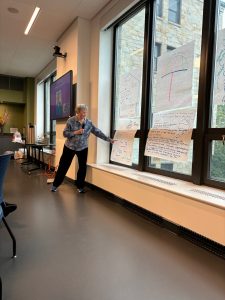 By Sr. Carol Breslin, MMM
By Sr. Carol Breslin, MMM
In September 2024, I once again represented MMM at the UNANIMA International (UI) board meeting in New York. UI now represents 25 congregations of women religious with ministries in 100 countries. It advocates at the United Nations on behalf of women, children, girls and other marginalised groups: the homeless, victims of human trafficking, immigrants, refugees, and the environment.
We aim to educate and influence policymakers at the global level. Through UNANIMA, MMM participates in Religious at the UN (RUN), a support group for religious organisations who advocate at the UN. UI is also a member of the Justice Coalition of Religious, which represents over 200 congregations.
The latest UNANIMA International update, available online (www.unanima-international.org) includes a story about MMM’s involvement with displaced people in northern Nigeria. The Executive Director’s Report shows a wide range of involvement in advocacy activities.
A Grassroots Story:
UI meetings include sharing stories on our ministries. I spoke about obstetric fistula, an issue of special concern for MMM. I described the causes of obstetric fistula and gynaecological fistula. The latter has become increasingly common in conflict zones, where rape is used as a weapon against female civilians and their communities
Prevention of obstetric fistula is critical, and includes access to education and basic health care and nutrition for girls, delaying the age of marriage and first pregnancy, basic obstetric care, and supervision and training of midwives and young doctors. The basic rights of women and girls in society must be promoted and men and boys need to be involved. In addition, surveys are needed to have accurate figures about the condition’s incidence and prevalence.
MMM has had a special role in developing services for girls and women affected by obstetric fistula in East and West Africa. Currently, at the Family Life Centre/VVF Hospital in Itam, Nigeria, there are regular surgical repair camps and more energy is being put into awareness-raising activities – at local gatherings and in remote areas. Staff provide maternal and child health clinics and Caesarean sections when needed.
Despite these efforts, obstetric fistula remains a public health concern, with a growing incidence in the Itam area. The SafeBirth4All Campaign was launched in Ireland in May 2024, a part of MMM’s involvement in obstetric fistula prevention and advocacy. Other issues
At this meeting, we decided to present the 2025 UI Woman of Courage Award to Juana García Valverde, a Spanish laywoman who has advocated for the most disadvantaged in Ancash, Peru, a Quechua-speaking area, for 41 years. She started a medical center and a homeless shelter, supporting the elderly and the hungry, often facing opposition from Peruvian state institutions.
The award honours women who have exhibited exceptional courage and leadership, especially to better the lives of women and children in their communities.
Sister Patricia Murray, IBVM, of the International Union of Superiors General, led a reflection on synodality and the future direction of UI.
Sister Maria Gonzaga Namuyomba, of our MMM Congregational Leadership Team, and MMM CPO Jacqueline McAuley, participated via Zoom. I was confirmed as a member of the By-laws and Policies Committee and am a member of a new Expanded Executive Committee. It is great to be part of MMM’s advocacy work in promoting the advancement of women and children.
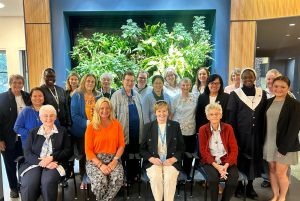
By Sr. Dr. Marian Scena, MMM
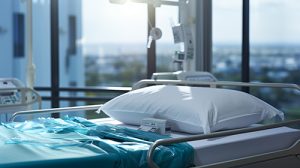
A year ago, a 28-year-old high school teacher came to be admitted to our Faraja Hospice and Palliative Care Programme. His name is “James”. Four years ago, James got a rash below his left eye which developed into a tumour. He did all the correct things: he went to a specialist hospital, had three different surgeries, received both chemotherapy and radiation treatment but the tumour kept coming back.
Now James is in the last stage of life with a grotesque cancer that has grossly disfigured his face and head! What could we do for him? First, we listened to his story and how this disaster was affecting his life. He seemed at peace with his condition knowing that he had tried every available form of treatment. Thank God, James doesn’t have pain, but it is difficult finding a comfortable position for sleeping. He is still able to eat soft food. His father is very sad but understands his son’s condition, as did James’ mother who was taking care of him day and night.
He is also cared for by his older brother who, it seemed to our palliative care team, was in a state of denial at the beginning. When I tried to talk with the brother, he got very angry and kept saying that James was fine! James lives outside our catchment area, so we can’t visit him at home like we usually do for our patients. But we keep frequent contact by phone with James and his father and brother take turns coming for medications and bandages. We are able to give them psycho-social support regularly.
With Hospice and Palliative Care in Africa we often are unable to do all that we would love to do for our patients because of distance and lack of resources. But we have a saying in palliative care that encourages us – We can’t do EVERYTHING for the patient, but we can ALWAYS DO SOMETHING!
We will continue to journey with James for as long as he is alive. We continue to try and help his family come to terms with this terrible disease and will continue to accompany them when James leaves this earth. And this gives me hope – that we can ease the suffering of others!
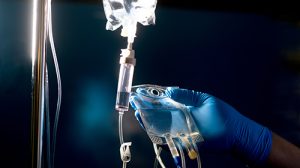
By Sr. Helen McKenna, MMM
“We go… where human need is greatest”.
(MMM Mission Statement)
Mother Mary, our foundress, prior to World War One, was a young lady of an Aristocratic family living in the suburbs of Dublin. Her daily activities would have included organising private garden parties, playing tennis etc. Domestic responsibilities would have been taken care of by housekeepers and maids.
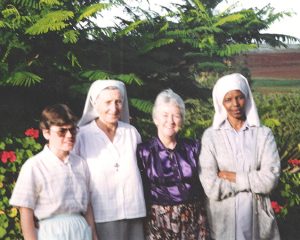
It was only with the advent of the first world war that a wider and more disturbing world intruded into her life. Her brothers volunteered to join the army. Marie, as she was known then, chose to train and work as a VAD nurse. She was sent to Malta to care for injured soldiers. Marie chose to change the direction of her life to meet a need. She and the MMM that she founded, have continued to ‘change direction’ to meet the needs of our times.
Marie was invited to Nigeria in 1922 expecting to work in a medical setting, only to find herself being asked to teach. She accepted that role but moved when it was appropriate back towards the medical ministry. Seeing the high rate of maternal and child mortality and morbidity while in Nigeria, she dreamed of forming a congregation, dedicated to the care of Mothers and Children.
Even after the congregation was founded and sisters began to work in Nigeria, another crisis needed attention; leprosy. So, in/near several of our hospitals, provision was made to take care of people with leprosy. In more recent years the problem with VVF became the focus of our work in several countries; Nigeria, Angola and Uganda to name only a few. Education to prevent these horrendous human conditions has and still is a big part of MMM Ministry.
In my own time working in Tanzania, I have seen the need to change paths to respond to the ‘greatest need’. We opened a new mission in Nangwa in Mbulu Diocese in 1985. We received medicines on a monthly basis called ‘Essential Drugs’. Within a short time, people from far beyond our catchment area made their way to our Dispensary and Outreach Centres. This led to a shortage of medicines before the end of the month. We had to look for alternatives to fill the gap. We turned to Reflexology using a book on the topic. Over time, I got an opportunity to take a full year’s diploma course to qualify as a Reflexologist and use it to this day, specialising in Hand Reflexology.
While serving the local community in Nangwa Tanzania, HIV/Aids appeared around 1990. Our dream had been to move further ‘into the bush’ to provide medical care for neglected and often despised Barabaig people. When Aids reared its head, we discerned and decided the most urgent need was to set up an intense education program to prevent HIV infection. We also set up a counselling program for couples who tested positive for Sexually Transmitted Diseases, a forerunner to Aids. We were also funded by SCIAF (The Scottish Catholic International Aid Fund). With their funds we developed a diocesan-wide program in each Dispensary in the diocese of Mbulu.
In the 90’s, following the decision of the Tanzanian Government to join the International Monetary Fund (IMF), food started coming in from Europe. I remember the first time Coca Cola, white bread and even bacon and sausages appeared in the shops. At first we were excited to see food from home but before long, it was clear that this European food was not better than the available food in Tanzania.
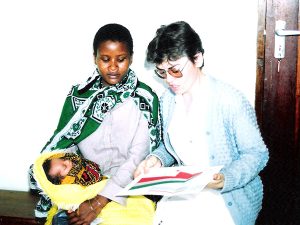
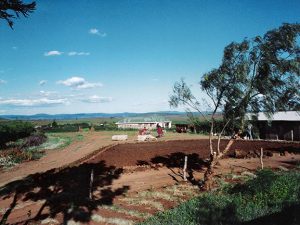
I took time to learn the advantages of good local food and even more so how the food was processed. Dehusking cereal became possible when milling with machines was introduced. This meant that the best part of the cereal was removed and fed to livestock. Again, I changed my manner of working and started teaching various groups on Nutrition. It was challenging to convince some people that their own food was actually superior quality to the new European novelty food. I continue to focus on this important aspect of Nutritional Education knowing that it would have long-term consequences for the people.
In summary, I would say that in MMM, we don’t follow the paths but we make new paths. We change and adapt our ministry in order to ‘go … where human need is greatest’.
By Sr. Bernadette Fadegnon, MMM
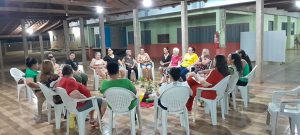
The State in Mato Grosso, where we are located, sponsored a course in Integrative Community Therapy for the health workers in the state. Because of the partnership we have with the Secretary of Health of our district of Alto Boa Vista, this opportunity was made available for us. I am ever grateful for the learning I am going through.
What is this Integrative Community Therapy (ICT)?
It is a practice of a round table conversation created by Dr Adalbeto Barreto, a Brazilian theologian, medical doctor, anthropologist, and psychiatrist who through his experience and observation, discovered that the reason why the majority of people go to see a doctor is not necessarily for physical illness treatment, but they just need to talk out their personal, family and work-related problems. And when they have the space to express what is bordering them, in the process they experience healing. He made the following hypothesis “when the mouth speaks, the body heals”.
ICT is the first and only therapy created by a Brazilian and is a technique where issues that are preventing one’s life to be well lived and flourishing, are expressed by the individuals in the group through focusing on the emotions/feelings that are behind the issue. With the help of questions and sharing of experiences, strategies from the same group are shared to deal with the issues. It is a round-table conversation where everyone is equal and could share his/her joy, pain and experience of how to deal with the specific situation. It is a kind of round table conversation that values the wisdom and support of the people in the group.
It could be thematic or non- thematic round talk. Dr Adalberto conducts many round table talks. One of these past weeks, he conducted a thematic round table conversation based on the recent concern in Brazil and around the world. The burning of forests.
He started by acknowledging the ongoing forest fire that we are hearing, seeing, witnessing and feeling around us and within us. These fires affect our physical health, causing allergic attacks, rhinitis, sinusitis, asthma. It also affects our mental and emotional health, causing anxiety, fear and panic. Our air is polluted and our children and elderly people are having trouble breathing.
The strong wind and lack of rain facilitate the spread of the fires and the spread of ashes. These fires in turn destroy houses, burn forests, and kill animals of every kind and is a cause of despair.
The forests that are the lungs of the planet are in agony. The scenario is chaotic.
This forest fire damage is not limited to just the destruction of forests and air quality, but it affects our mental health.
Like a forest fire, the human person can witness outbursts of anger, panic attacks and depression. A short temper can lead to explosive and devastating attitudes. Strong emotions can cause emotional problems such as anguish, despair and helplessness. The lack of love, blind passion, and anger can cause problems between us and those we love and live with.
In the same way that a fire can destroy the wealth of a forest, uncontrolled emotions can destroy friendships and prevent us from living peacefully as brothers and sisters.
Like the smoke of a burning bush can block the view of the horizon, so also our limited knowledge can lead us to preconceived ideas and stereotyping one another. This can prevent us from embracing people and realities as they are.
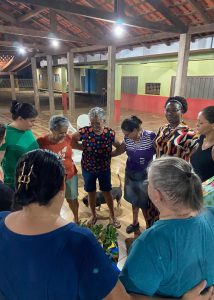 Just as breathing toxic smoke for a long time can lead us to serious health problems and even cause death, breathing in environments polluted with jealousy, distrust, betrayal, uncontrolled anger and despair, can lead us to lose the ability to distinguish between right and wrong or between good and evil. Explosive emotions can intoxicate our conscience and environment.
Just as breathing toxic smoke for a long time can lead us to serious health problems and even cause death, breathing in environments polluted with jealousy, distrust, betrayal, uncontrolled anger and despair, can lead us to lose the ability to distinguish between right and wrong or between good and evil. Explosive emotions can intoxicate our conscience and environment.
An uncontrolled forest fire can remind us of our uncontrolled emotions and “Affective Fires” and alert us of the need to take care of our emotions and learn to control them through dialogue and peaceful conversations like round table conversation.
By learning to manage the intensity and nature of our feelings, we can avoid emotional devastation and foster healthier connections. And in combating the destructive fire of the aggressive impulse of hate, we can heal a wounded heart, console a desperate mother, and encourage children surviving family traumas.
It is important to seek emotional support during these difficult times around the world. Whether through friends, relatives and family or through individual or group therapies.
We need to open the window of our hearts to welcome people. In the same way that the heart can explode, with anger, hurt, jealousy and despair and destroy us and the others around us, the heart is also capable of offering warmth, tenderness, acceptance, and thus building friendships and bonds.
It has been a learning experience, and we have begun the ‘Roundtable Conversation Therapy’ in the women’s group in the parish and other parishes that have invited us. It is indeed true that when the mouth speaks, the body heals! It seems to be making a difference in the lives of the people.”
By Sr. Maria Jose da Silva, MMM
Sr. Maria Jose da Silva, MMM who comes from the south of Brazil in Parana State shares her personal experience of a visit home…
“I was in Parana in September this year and the smell of the smoke from the fires around the country was very strong and it affected many people who had their lungs affected. I visited one of the neighbours in my hometown. They shared with me how the fire came very close to their farm. This family used to have some cows to milk and depended on them for their survival. When they heard and noticed that one side of their farm was on fire, they got desperate.
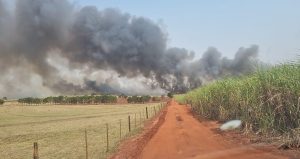
The whole family is very active in the church and used to sell milk to many other families in the town. I heard from Vilma, that one day the farm was surrounded by the fire, and many other small farms got burned. Her own farm was prevented from being burnt; they believe by prayer. They started to pray and to entrust their property to God’s protection and our Mother Mary to care for their only means of living.
By the end of that day their farm didn’t get burnt and she attributed that to a miracle. She said to me. “It was God’s hands that protected us from fire.” It is amazing the faith of the people and how much their trust is placed in God’s hand and Our Lady, Mother Mary, for their protection.
I believe that our planet needs people with that faith and commitment to life to protect our planet from dying and being destroyed from all kinds of damage. Our planet is crying loud for help and many creatures and nature are dying from lack of care. I am deeply convinced that if each one keeps trying to make a difference in caring for nature, life will last longer. Let’s join hands and start with small actions and care for the earth.”
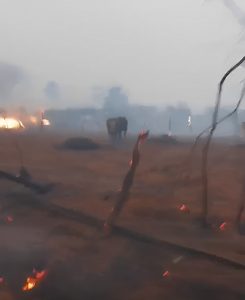
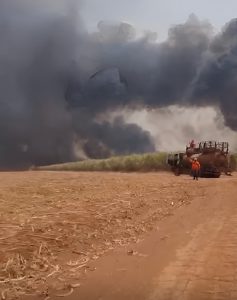
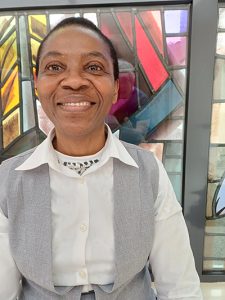
by Sr. Cordelia Nwaokike, MMM, Benin City, Nigeria
Ikechukwu Onyenuma, 29 years old, is a naturally talented and vibrant young man. He comes from the eastern part of our country, Nigeria. You can sense, from the first conversation with him, that he is somebody who loves life and the people around him. He has a lot of energy for many kinds of physical work. We met him the day we went for a burial in the eastern part of Nigeria. He came to the burial ground begging for alms from people. We were with a Sister of another congregation when we saw him. He looked emaciated, anaemic and a bit sad.
We stopped to greet him. Further conversation revealed that he had had a motorcycle accident and had suffered bruises and wounds. The bruises dried up, but the wound on the leg escalated to a huge leg ulcer. He had been three and a half years in this condition. He went to several hospitals for treatment, but all in vain. He said his father died long ago, and his mother has been struggling to help him but she ran out of money to continue. Many people promised to help, but all disappeared at the sight of the wound. It frightened them. I asked his permission to photograph him and to use his name and he agreed. When we returned to our community, we told the Sisters about the young man and, after some investigations, the community decided to help.
With a grant from our donors, he has been in the hospital for the last two months. Some investigations were carried out, but the doctors were not able to save his leg and an amputation was done. He is
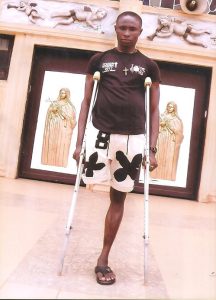
receiving treatment and daily dressings are being carried out, waiting for the wound to heal. Presently he is using crutches for mobility, and he is happy with himself, and the help given to him. MMMs have indeed given him hope to live again.
When the wound is healed, we are hoping to find him an artificial limb.
Now Ikechukwu is so happy that his problem is almost fully solved, and this has given him the opportunity to see and think clearly. He is thinking of his future which has been compromised by his former condition. He is working towards independence and living life to the full. This was only possible through the support of the charitable people of God. His mother will be helped to establish a small business to enable her to put food on the table.
We are grateful to our donors, to the Medical Missionaries of Mary Congregation and to all who have contributed to ending the long and painful suffering of our young man, Ikechukwu. May God bless all our donors and reward you all, through Jesus Christ our Lord. Amen.
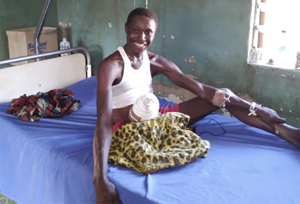
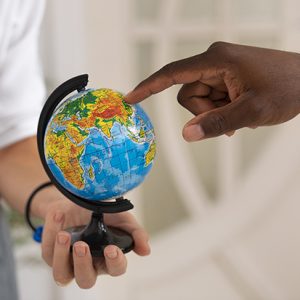 This is the exclamation of many overseas visitors to MMM communities in Africa and Latin America. Often MMMs can be found “at the end of the road”. Why? MMMs tend to go where no one else is willing to go. We go to remote rural areas, like Turkana or Maasailand, and inner-city slums like Sao Paulo, Lagos or Nairobi. In these places there are no proper roads, often no water or electricity, and generally poor infrastructure.
This is the exclamation of many overseas visitors to MMM communities in Africa and Latin America. Often MMMs can be found “at the end of the road”. Why? MMMs tend to go where no one else is willing to go. We go to remote rural areas, like Turkana or Maasailand, and inner-city slums like Sao Paulo, Lagos or Nairobi. In these places there are no proper roads, often no water or electricity, and generally poor infrastructure.
These are the areas where the poor and neglected are. MMM has a special gift for working with mothers and children. That was the need Mother Mary saw in Nigeria just over a hundred years ago. We pay attention especially to areas where women’s lives and health are under-valued.
But we do not stay forever! We hand over and leave when services are established, when local people have more opportunities. We live by the maxim:
“Go where you are needed but not wanted. Stay until you are wanted but not needed”
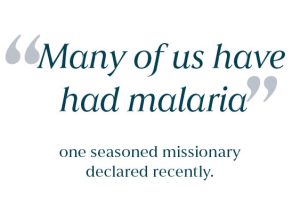 What is malaria and how do you get it?
What is malaria and how do you get it?
Malaria is a life-threatening disease, usually spread to humans by some types of mosquitoes. It is mostly found in tropical countries. It is preventable and curable. The infection is caused by a parasite and does not spread from person to person. Symptoms can be mild or life-threatening. Mild symptoms are fever, chills and headache. Severe symptoms include fatigue, confusion, seizures, and difficulty breathing. Infants, children under 5 years of age, pregnant women, travellers and people with HIV/AIDS are at higher risk of severe infection.
Malaria can be prevented by avoiding mosquito bites and with medicines. Treatments can stop mild cases from getting worse.
The 2023 World Malaria Report, published by WHO, examined the link between climate change and malaria. Changes in temperature, humidity and rainfall can influence the behaviour and survival of the malaria-carrying Anopheles mosquito. Extreme weather events, such as heatwaves and flooding, can also directly impact transmission and disease burden. Catastrophic flooding in Pakistan in 2022, for example, led to a five-fold increase in malaria cases in the country.
The disease burden is felt highest in Africa. In 2022, Africa was home to about 94% of all malaria cases and 95% of deaths. Children under 5 years of age accounted for about 78% of all malaria deaths in African countries. The number of infections worldwide was slightly higher in 2023 than 2022.
Why are things not getting better?
Progress in malaria control is threatened by emerging resistance to insecticides among Anopheles mosquitoes. These insecticides are used on mosquito nets and for indoor spraying. Other threats include insufficient access to treated nets due to the stresses of day-to-day life outpacing replacement, and changing behaviour of mosquitoes, which appear to be biting early before people go to bed and resting outdoors, thereby evading exposure to insecticides.
Signs of hope
Two new anti-malaria vaccines are being tried out for young children. Preliminary results show great promise, but a good public health system needs to be in place to make any change long-lasting. Often this is difficult in conflict torn areas such as Niger, Sudan and the Democratic Republic of Congo.
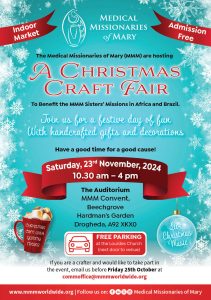
Our third Annual Craft Fair will be held in the MMM Auditorium on Saturday, November 23rd.
It will be the last one in this venue as the MMM Auditorium will be part of the new Drogheda Hospice which is being built around this site. It will not be the end of the Craft Fair – we will just change venue!!
So, those of you who are “crafty” are encouraged to participate in the ways you feel best. Those less talented can come along and enjoy other people’s work. Hopefully we will have visiting choirs with Christmas music, and of course “the wee cup of tea”. It is also a chance for anyone who wants to learn something of our MMM heritage to visit the Mother Mary Room.
All are welcome!
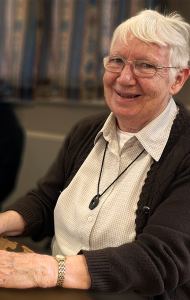
This summer, Sr Rita Kelly, MMM gave a presentation at a significant conference at Las Casas Institute for Social Justice at the University of Oxford. The Las Casas Institute brings together a growing academic family or community of scholars, mainly lay women and men, who draw on the rich tradition of Catholic social thought, teaching, and practice.
Sr Rita presented her paper at the conference called “Forgotten Voices in Literature and Religious Conference, Blackfriars Hall. It was organised by the Las Casas Institute for Social Justice, a Dominican foundation.
Her presentation, “Wounded Healers, Narrating Our Personal Experiences,” was based on her vast experience working with returned missionaries in the Irish Missionary Union (IMU). She initiated the IMU-REAP team in a response to their needs and as an acknowledgement that many missionaries experience stress and trauma in the field. Her presentation was well received and created much interest.
In addition to delivering her paper, Sr. Rita met the members of the Las Casa Institute through the MMM Communications Department when they were doing research on “Recovering the voices of Sisters who have conducted challenging ministries in conflict zones.”
Sr. Rita is the former MMM European Area Leader. She is currently gathering oral histories of local people who knew Mother Mary Martin, MMM Founder. She is also co-authoring a children’s book on Mother Mary’s life. The book will be completed by the end of the year.
